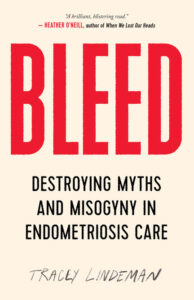April 11, 2023
Gleanings
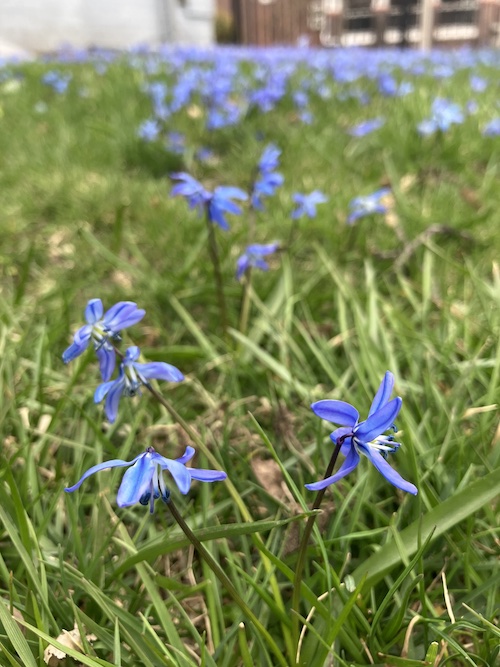
- I think about the moment I found out I was pregnant and how I counted the years until my pregnancy would turn eighteen which felt like a hundred years from then and now it’s here. That people talk about empty nesting but not about this weird transitional in-between existential crisis of WAIT IT’S OVER. HOLD ON… WAIT, WHAT!? Like… for example, no one really talks about the funeral procession that is college tours.
- I cannot tell you what a gift that little message has been to me. A touchstone of sorts. A simple gesture that serves to remind that someone crazy enough to ride his bicycle from San Diego to St. Augustine, loves me. Now, how cool is that? Pretty dang cool!
- Now there’s a word – unfiltered – that seems like it could be a good thing. It conjures up being unshackled or uncensored, freedoms we value in some contexts. However, our echo chambers of social media and curated streaming services lull us into a false sense of security that everyone is going to unfilter their messages the same we we would. At least I did. But, as I recently discovered, being unfiltered isn’t always desirable.
- Writing is my way of exploring and making sense of what I’m feeling in my heart. Once it’s all committed to words, I do a little editing and then post about one in ten to my blog. It is a privilege, being able to freely publish, but it is an absolute honour receiving all the feedback, the sweet (and snarly) comments and especially all the words of support and encouragement.
- I describe it like this to clients: You’re not just crossing unknown terrain, you’re creating the land as you go. And the first time across, the goal is to get to the end. Along the way you might drop flags in the ground, markers of places where you need to return and fine tune. Maybe add an oasis in this desert; get specific about the flora and fauna in this forest.
- And here I am, Sunday morning, ready to pull the covers over my head again. This time, not from a feeling of despair but rather a sense of deep contentment.
- I am the slowest moving tortoise, let’s call me a giant galápagos, but even the giant galápagos moves a couple of kilometers each day.
- Good writing has a lot to do with specific detail — it’s not just any blue cup that broke, it’s the blue pottery cup with the crooked handle that he found at the thrift shop and presented to her, down on one knee, when she was hoping for an engagement ring.
- When will I learn/ to trust what I see, what I feel/ what I know?
- My point is that the behavior is exactly the same! Assuming I am speaking to a fellow Old here: you did things for “likes” too! You brought the “right” book or stack of comics to be seen reading at lunch. You wore sunglasses when you didn’t need to, fished the band t-shirt out of the laundry, and went specifically to the graveyard with your sketchbook to smoke cigarettes.
April 6, 2023
AFAF Mood Board: Part One
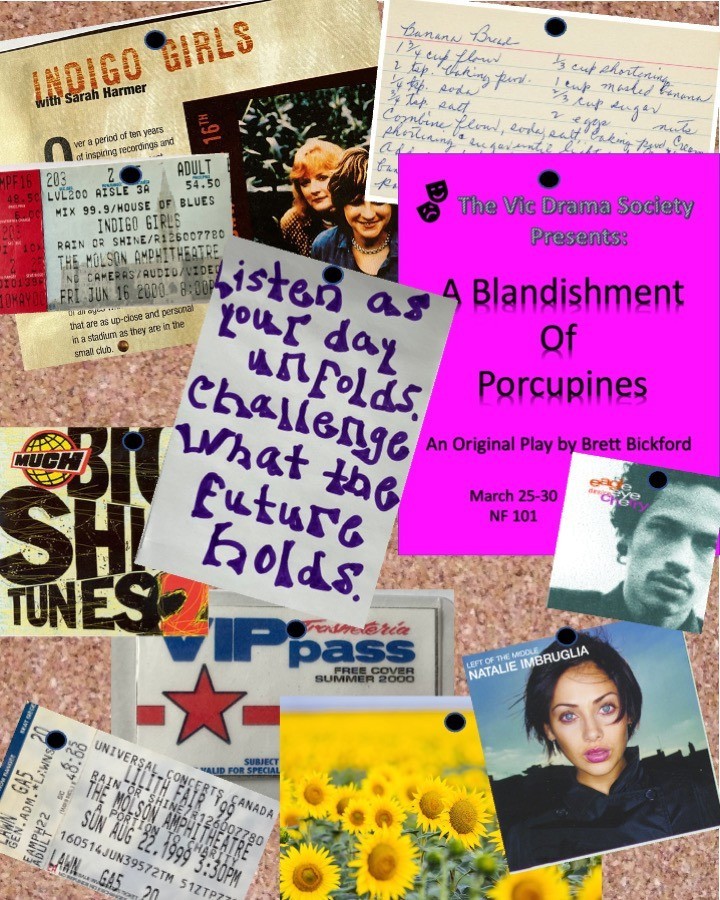
Yesterday marks five months before the release of my new novel, and to celebrate, I’m sharing a mood board for opening chapter, set from 1998-2000. So excited to share this book with you!
April 4, 2023
On Choosing Harriet
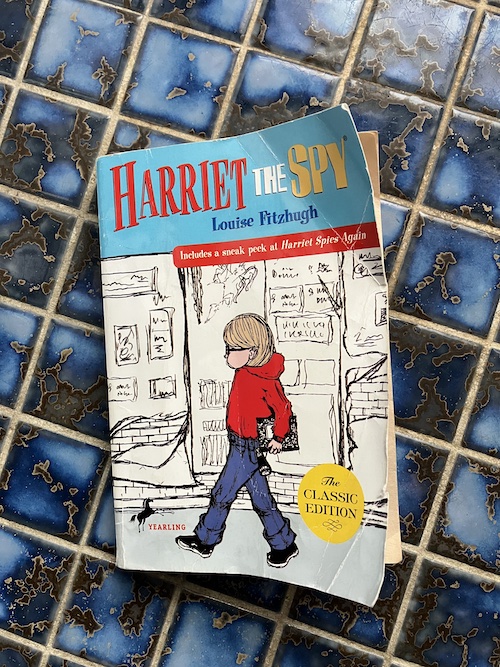
As I’ve talked about many times—it was a formative experience that would inspire both my first novel and the name of my firstborn child—I didn’t read HARRIET THE SPY until I was 27, which I’ve always known was a blessing. Although I’d been a fan of Louise Fitzhugh’s slightly less bizarre (but only slightly) sequel THE LONG SECRET, which I read regularly throughout my childhood, tracing my fingers along the lines on the map that opened its pages. It’s a weird book, but not as weird as the Fitzhugh O.G., whose charms would have washed right over me as a young reader too firmly wedded to conventionality.
It wasn’t until that I was almost 30 that I was ready to receive its message about telling the truth, and being unlikable, and being brave, and true to oneself. When I was 27 and finally coming of age in a way that was real to my bones, HARRIET THE SPY read like a revelation.
At almost 30, I wanted to be like Harriet—that courage, that gumption, no fucks to give. And I wanted the same for my child, my daughter, who was born two years later, whom I named Harriet, imagining—the same mistake I’ve made in parenthood over and over—that she could be fully hatched as such, that I might have learned all my lessons so that she wouldn’t have to.
Last night I finished reading Harriet the Spy again, aloud to my family, the second or third time I’ve read the novel with my children, but the first time since they were old enough to critique it—they’re weeks away from turning 10 and 14. And this is the closest I’ll ever come to reading it as a child myself, because I was reading it through their impressions of the novel, and—just as I would have done if I were 10 and 14—they found the whole thing unfathomably weird.
And I did too, which I don’t remember so much from when I was 27. The unevenness of its structure. The writing is kind of sloppy in places. Why does Pinky Whitehead have the same last name as the head teacher? Someone “gasps audibly,” which, as any editor will tell you, is the only way to gasp, right? Harriet M. Welsch, I can see now in a way I didn’t have the vocabulary for 15 years ago, clearly (and wonderfully!) exists on the autism spectrum. And oh my goodness, she struggles so much, which I see now as I read like as a mother. She’s not badass, she’s tortured. She’s hurt and confused and railing against a mold into which she doesn’t fit. At age 27, I admired her obstinacy, but now I read her and think, “Oh, man! That must be so hard!”
And what a complicated legacy that is to hand to your child—how I see that now. When our children are hypothetical, of course, we dream that they will be strong, and defiant, demand tomato sandwiches. Who’d want a child who was like everybody else, prissy and obnoxious like Marion Hawthorne or Rachel Hennessy? Fitting in to the point where one’s character gets lost, and they’re just part of the crowd. Who’d want a kid who never gets in trouble, or ruffles feathers, or who gets along with everyone? Who wouldn’t want a daughter like Harriet?
But now, nearly fourteen years into parenthood, I see that these questions—in practice—have answers far more complicated than I thought they were when I first asked them. I see how we imagine our children will be brave and bold—and they have to be!—but how difficult it is to be so. How we imagine our children will be strong individuals, and raise them not to follow the crowd, to be like everybody else, but how painful it feels when they don’t fit in. How we (okay, maybe I’m talking about ME) bring all our own painful childhood struggles and experiences to the table, projecting them onto whatever our kids are going through, so that we’re all just mired in emotions and projections (and sometimes it’s difficult to tell where they end and we begin). How we might name our child Harriet and then reread the book and realize that this is an awful lot to carry in a way we really didn’t get at the time.
My particular Harriet, at the moment, is in a pretty good place—though I’ve knocked wood just now, because I’m afraid that I’ll jinx it. (In parenthood, nothing ever stays the same for a moment, which is a blessing when things are hard, but can be a curse when things are otherwise.) But oh, there have been tough times as she’s been finding her way and growing into herself, and there were times I wished for the ease of a Rachel or Marion, for her to be a kid who knew the script and could recite it flawlessly.
I had no idea what I was signing up for all those years ago when I chose her name out of a book.
But I suppose that’s the case no matter what your child’s name is.
April 3, 2023
New Book Quiz!
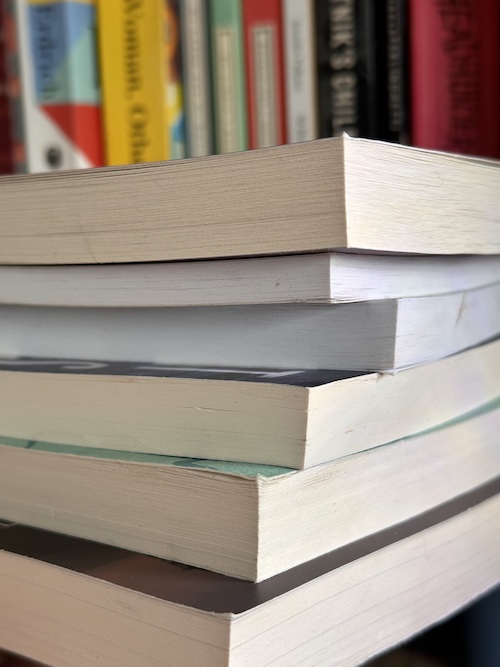
Which one of these fantastic books is your next favourite read?
Take my new quiz to find out!
Yep, I’m back with some literary matchmaking after far too long and I’m THRILLED to be setting readers up with some books I’ve loved lately…
March 29, 2023
Gleanings

- March… ah, March. It’s a month, a verb, a noun, … a promise.
- There are moments when one’s actual happening life feels fully integrated and aligned with one’s intentions and beliefs. This was that.
- If you know what “three on the tree” means, you’re no kid. And when you were one, there’s a good chance you lived on a farm.
- When we allow ourselves to be fed single narratives by others, by people in power in the mainstream, then we are in danger of stereotypes and preconceptions taking root in our minds.
- As to my fondness for poetry, Mrs. Nelson always said that my preference was twofold; because I was a lazy reader – I could quickly read a poem and get right onto analysing it for an assignment or essay, and because I loved music so much – the cadence of poetry dovetailed into that passion.
- That’s my dream—to one day have that conversation with my children about when the country’s grown-ups finally pierced the veil, understood that we would never understand one another completely, but we could still agree on wise limitations that would save lives and our very own American souls.
- ‘Whose needs are you meeting by visiting your husband?’ My therapist asks me./ Today I can speak the truth she has known for much longer than I have. Mine. My needs.
- Part of what I do when I lie awake at night* is fret about lying awake at night. (I’m fun like that.)
- The other morning I asked my husband, did you not sleep well last night? He had been so restless. He informed me that I had spent most of the night ‘manipulating’ the blankets, pulling them off him, twisting them around me, and leaving him naked to the cold air blowing in from our window. And, he added, my snoring had been off the charts! Why didn’t you wake me? No, he said, you were clearly having a good sleep.
- I love all the kids, all of them, with all of the learning they still have to do, and all they have to teach us as they do. (especial love today to trans kids and the kids without a box. holding them to the deepest depth of my ability. how incredibly brave they are to make something new.)
- I can now tell my neurologist that I doodle.
- I was remembering things more or less correctly but how easily I took for granted the actual fact that I was Greece. That I walked up the marble steps to look at the Erechtheion, the porch of the maidens, the wildflowers growing on the hill.
- I read that one of the most critical parts of any journey is the return home. That the journey asks, for us to gather up the medicine that we found along our way, and bring it back … not just for ourselves, but to our home, our community.
- Do you want to know what’s almost as magical as an animal friend that goes for a walk and comes home on her own? Plants that make little hard, dry seeds and then give them to you so you can collect them and make new plants from seemingly nothing the next year.
- I think what drew me back to thinking again about and wanting to re-watch RW is for what it teaches us about knowing. How things and information can move in and out of the light, how the way we know things is more fluid than we’d like, and how we’re continually trying to make sense out of what we see, and then act on that to the best of our ability (knowing that we don’t know everything).
March 27, 2023
My Boots Match My Book
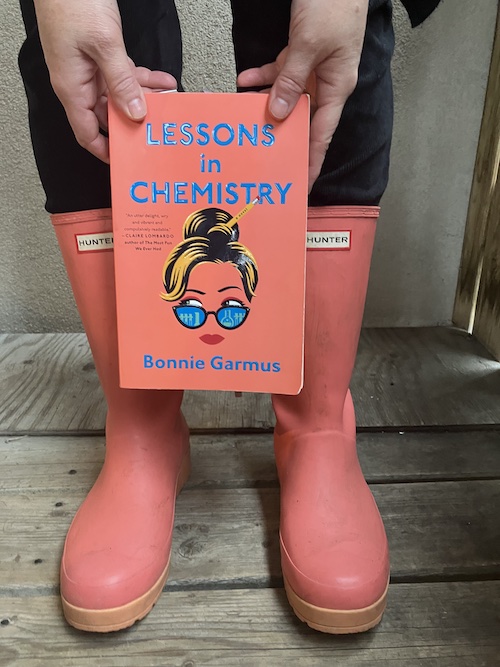
I made up a thing called International Match Your Book to Your Boots Day on the occasion of my wellies being broken out for spring at the same time I’m finally reading Bonnie Garmus’s Lessons in Chemistry, which I started reading yesterday evening and am already more than halfway through. It’s so good—it sparkles. This evening I am aiming to put dinner on the table as early as possible so that I can put on my pyjamas as soon as I can and retire to bed to read the rest of it.
March 23, 2023
Bleed, by Tracey L. Lindeman
The first time I heard about this book was last fall while I was drinking tea in Jennifer Knoch’s garden and asked her about amazing books she’d edited that were coming down the pipeline, and she talked about BLEED so passionately and made clear that this was a book that everyone should read, not just people with experience suffering with endometriosis.
And then two more people I deeply admire—@aborshpod’s Rachel Cairns and @yellowmanteau (Julie L. Lalonde)—started posting about it on Instagram, weaving its threads into the stories they tell online about reproductive justice and feminism/violence against women respectively—and showing too that all these stories are connected, for worse (because such tangles makes everything so much more *complicated* and difficult to resolve) and also for better (improving healthcare for people with endometriosis means better outcomes for *everyone*).
In BLEED, Lindeman uses a mix of memoir and reporting to show how her brutal and painful experiences with endometriosis since age 11 is representative of the suffering of so many other people, and also how the lack of care endo patients receive highlights sexism, racism, classism, anti-fatness within the medical system. Most doctors aren’t aware of how to diagnose endometriosis, let alone how to treat it—thanks to the influence of pharmaceutical companies, patients are usually given pills before surgery, pills that are ineffectual at best, harmful at worst.
Those who ask for surgery receive push-back from doctors who wish to preserve patients’ fertility, even when patients are adamant that they do not want children. Patients are caught in a catch 22 where they’re able to mask their symptoms and remain high functioning, which comes to undermine their complaints, or else they’re overwhelmed by the physical and mental toll of endometriosis and dismissed as just hysterical.
It was interesting to read BLEED in the context of another book I’ve recently read, Felicia Kornbluh’s A WOMAN’S LIFE IS A HUMAN LIFE about the parallel battles for abortion access (by white middle class feminists) and against forced sterilization (by working class activists of colour). At first glance, these two through-lines seem entire separate, even opposed, from each other, let alone Lindeman’s narrative. In a politics of either/or, black and white, this is certainly the case—but life is not like that. And—as Kornbluh’s book made clear—insisting that it is undermines justice and progress for everybody.
Lindeman’s narrative overlaps with Kornbluh’s when she writes about how birth control drugs were tested on people in Puerto Rico…and then ultimately dispensed in huge amounts to the general public in what purported to be a kind of liberation, but perhaps at a cost that most people don’t like to talk about, mostly because the people who are talking already are religious zealots seeking to control women and also because who wants to be opposed to liberty?
This narrative is messy and demands attention to nuance, and it also challenges me as someone who has mostly been served by the medical establishment so far throughout my life, never meeting with the roadblocks and suffering that becomes standard for Lindeman and others with endometriosis (and PCOS, and a litany of other chronic illnesses, and also [the much feminized and therefore maligned] chronic pain). It’s also a narrative that doesn’t come with neat and tidy ending, for the patients themselves or the system at large. The end of BLEED is just the beginning, after all, of—hopefully—a powerful reset and reimagining of how our medical systems are structured, and what reproductive justice/’my body my choice’ really means.
March 22, 2023
Asking for a Friend: Cover Revealed!

I am beyond thrilled to finally be sharing with you the gorgeous cover for my new novel, ASKING FOR A FRIEND, coming September 5, 2023, from Doubleday Canada, designed by the talented Lisa Jager. It’s the cover of my wildest dreams, encompassing two of my favourite things, extravagant sunsets and SWIMMING, and it’s such a wonderful encapsulation of this story, which I’m so looking forward to sharing with the world.
You can preorder your copy now at the SHOP LOCAL link at my publisher’s homepage, or at your favourite bookseller. Stay tuned for preorder goodies and launch plans.
March 21, 2023
Gleanings
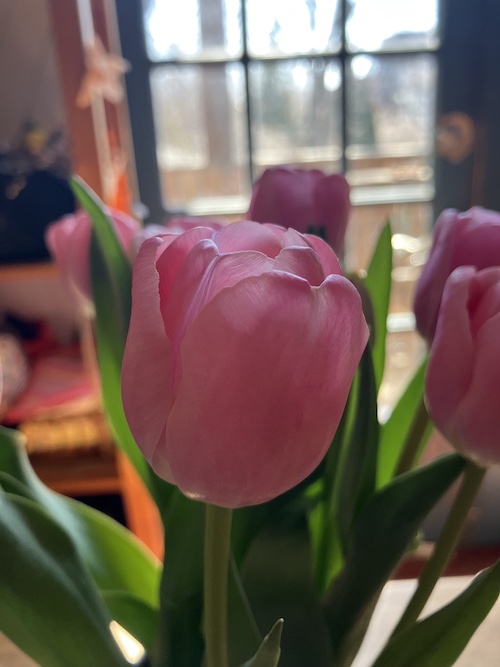
- It’s taken me years to realize that fancy notebooks are stifling. Beautiful, but stifling. Because unless I write really slowly, I’m a messy writer. And slow, pretty writing isn’t helpful when you’re just trying to get ideas out.
- This being human is so unique… to have the awareness of the past and future, the yesterday and the tomorrow can wreak havoc on my heart.
- How often — will it be for always? — how often will the vast emptiness astonish me like a complete novelty and make me say, ‘I never realized my loss until this moment’? The same leg is cut off time after time. The first plunge of the knife into the flesh is felt again and again.
- What makes for strong writing in math? I asked. Everything serves a purpose. It ties together. There’s not a lot of extraneous stuff. Importantly: there is clarity.
- I read in part because I like to. I also read because I write, and reading helps me learn. And I read because I enjoy stories, and people, and challenging ideas, and other peoples’ expertise.
- I’m not sure I even knew my Yiayia wasn’t Greek until my teens, which given her terrible Greek accent and strawberry blonde hair shows how very up my own arse I was.
- When I went out to see if the crocus in the garden had opened yet, wanting a photograph, I saw the rhubarb unfurling. Looking ahead, I am thinking about crumbles, pies, jam with ginger, and compote to have with yogourt.
- This book is so ambitious which made it also bulky. This put off some who wanted it trimmed down, but I’m here for women writers who want to take up space. After so many years of impressionistic, slim novels, I’m finding something revelatory about bigger novels. They aren’t afraid to sprawl.
March 20, 2023
March Break
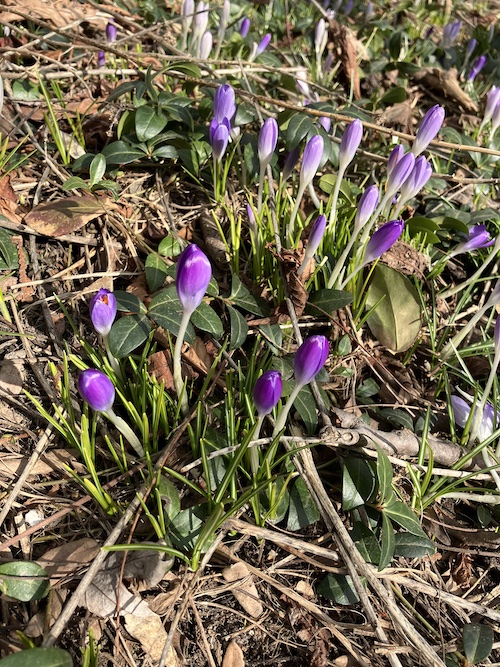
I loved our March Break holiday this year, a March Break so normal that I even forgot to find “normal” remarkable. Our kids brought their indoor shoes home, but not because we weren’t sure they might ever go to school again, and that Friday was a blizzard, and if I’m talking about it like it was 187 years ago, it’s because it feels like it, because our holiday was relaxing, a proper reset, but also because a week after that blizzard (which we weathered while eating pizza and watching Newsies [omg, so good, first time I’ve seen it in 30 years!]) there were crocuses in bloom, and it feels like spring. No doubt winter still has a few wallops in store, but spring feels possible now, and getting here feels like an achievement.
I handed in edits for my book just before the holiday and so I had the luxury of working half days in the mornings (after 8 am swims!) and spending the afternoons with my children on local adventures. They loved it too because it was just the right balance of lazing around playing video games until their eyes glazed over, and fun being out in the world (with friends!). And I liked that I genuinely had less to do, so it wasn’t me scrambling to fit everything into a smaller time-frame (which would make me very grumpy). It was a holiday for all of us, even Stuart, who still had to work while we were gadding about, but having no weekday activities in the evening was a break for everybody.
We went swimming at the community centre; went to see Winter Stations at Woodbine beach and went out to lunch with friends; our kids had friends over to help us eat our chocolate pie; we went to Leslieville to meet our pals and for cookies, book buying, and thrifting; our kids got awesome new haircuts; on Friday we went to see The Parent Trap at Paradise Theatre; more community centre swimming; and then we closed off the holiday yesterday with the T. rex Exhibit at the ROM, where I learned why it’s T. rex and not T-Rex, ie why T. rex isn’t J-Lo.
We had lots of time to laze, to rest, to read, to sleep, to visit, to sing, to whiz across town on transit, to snack, to wonder, to climb, to dance, to build, to spin, to dream, to be. I even got my taxes done! It was a very good week.
